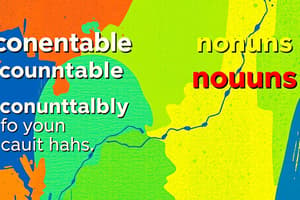Podcast
Questions and Answers
Which type of noun does not have a clear concept of plural?
Which type of noun does not have a clear concept of plural?
- Countable nouns
- Abstract nouns
- Uncountable nouns (correct)
- Proper nouns
What is the singular verb form typically used with uncountable nouns?
What is the singular verb form typically used with uncountable nouns?
- Base form verb
- Past tense verb
- Singular verb form (correct)
- Plural verb form
Which article refers to a specific noun that has already been mentioned or is unique?
Which article refers to a specific noun that has already been mentioned or is unique?
- An
- A
- The (correct)
- None of the above
When should you use the indefinite article 'an'?
When should you use the indefinite article 'an'?
What is the main function of prepositions in a sentence?
What is the main function of prepositions in a sentence?
Which of the following is a collocation?
Which of the following is a collocation?
What is the purpose of prepositions in a sentence?
What is the purpose of prepositions in a sentence?
Which of the following is an example of a collocation?
Which of the following is an example of a collocation?
What do modal verbs express?
What do modal verbs express?
Which pair of words form a collocation?
Which pair of words form a collocation?
What do articles like 'a' and 'the' help indicate in a sentence?
What do articles like 'a' and 'the' help indicate in a sentence?
Why are collocations important in language use?
Why are collocations important in language use?
Flashcards are hidden until you start studying
Study Notes
English Grammar: Exploring Key Concepts
In the world of English, grammar is like a well-woven web, providing structure and clarity to our written and spoken communication. Today, we'll delve into several essential concepts that will enhance your understanding of the English language. We'll explore uncountable nouns, articles, prepositions, collocations, and modal verbs, all of which are vital to mastering English grammar.
Uncountable Nouns
Uncountable nouns, such as "love" or "information," do not have a clear concept of plural. They are not typically counted and usually require a singular verb form. For example, "I love chocolate" and "We love chocolate" both use the same singular noun form. Unlike countable nouns, like "apples" or "books," which can be counted and have a clear plural form, uncountable nouns do not conform to this rule.
Articles
Articles are essential for specifying the type and number of nouns in our sentences. English has two articles: definite ("the") and indefinite ("a" and "an"). The definite article, "the," refers to a specific noun that has already been mentioned or is unique. For example, "the sun" or "the library." The indefinite articles, "a" and "an," are used when referring to non-specific nouns. For example, "a book" or "an apple".
Prepositions
Prepositions are words that show the relationship between a noun and other words in a sentence. They typically introduce a noun phrase, which can be a prepositional phrase. For example, "on the table" or "in the library" are prepositional phrases. Prepositions are essential for understanding relationships between words and can indicate when, where, how, or why something happens.
Collocations
Collocations are combinations of words that commonly appear together in a specific context. They are not just about the meaning of individual words but also the relationships between them. For example, "red apple" or "fast car" are collocations. Collocations are essential for sounding like a native speaker and can help you avoid awkward phrasing or unnatural-sounding sentences.
Modal Verbs
Modal verbs are a special class of verbs that express necessity, permission, ability, possibility, or obligation. They are often used to express attitudes towards actions or events. For example, "can" and "may" indicate ability or possibility, "must" indicates necessity, and "shall" or "will" indicate future actions. Modal verbs do not have a base form and are unique in the English language.
By understanding these key concepts, you will be well on your way to a deeper appreciation for the English language and a more confident ability to communicate effectively in any situation. Remember, practice is essential to mastering any language, so keep reading, writing, and speaking to perfect your grammar skills.
Studying That Suits You
Use AI to generate personalized quizzes and flashcards to suit your learning preferences.




